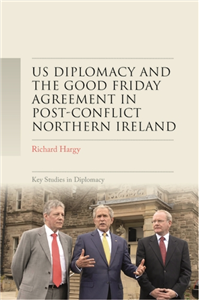US diplomacy and the Good Friday Agreement in post-conflict Northern Ireland
by Richard Hargy
Description
More Information
Rights Information
Albania, Algeria, Angola, Argentina, Armenia, Australia, Austria, Bahrain, Belgium, Belize, Benin, Bolivia, Bosnia and Herzegovina, Botswana, Brazil, Bulgaria, Burkina Faso, Burundi, Cameroon, Canada, Cape Verde, Central African Republic, Chad, Chile, China, Colombia, Comoros, Congo [DRC], Congo, Republic of the, Costa Rica, Ivory Coast, Croatia, Czech Republic, Denmark, Djibouti, Ecuador, Egypt, El Salvador, Equatorial Guinea, Eritrea, Estonia, Ethiopia, Faroe Islands, Finland, France, French Guiana, Gabon, Gambia, Georgia, Germany, Ghana, Greece, Guatemala, Guinea, Guinea-Bissau, Guyana, Honduras, Hongkong, Hungary, Iceland, India, Indonesia, Iran, Iraq, Ireland, Israel, Italy, Japan, Jordan, Kazakhstan, Kenya, Kuwait, Latvia, Lebanon, Lesotho, Liberia, Libya, Lithuania, Luxembourg, Macau, China, Macedonia [FYROM], Madagascar, Malawi, Malaysia, Mali, Malta, Mauritania, Mauritius, Mayotte, Mexico, Mongolia, Montenegro, Morocco, Mozambique, Namibia, Netherlands, New Zealand, Nicaragua, Niger, Nigeria, Norway, Oman, Pakistan, Panama, Paraguay, Peru, Philippines, Poland, Portugal, Puerto Rico, Qatar, Reunion, Romania, Russia, Rwanda, Saint Helena, Sao Tome and Principe, Saudi Arabia, Senegal, Serbia, Seychelles, Sierra Leone, Singapore, Slovakia, Slovenia, Somalia, South Africa, South Korea, Spain, Sri Lanka, Sudan, Suriname, Swaziland, Sweden, Switzerland, Syria, Taiwan, Tanzania, Thailand, Timor-Leste, Togo, Tokelau, Tunisia, Turkey, Uganda, Ukraine, United Arab Emirates, United Kingdom, United States, Uruguay, Venezuela, Vietnam, Western Sahara, Yemen, Zambia, Zimbabwe, South Sudan, Cyprus, Palestine, Bangladesh, Cambodia, Liechtenstein, Azerbaijan, Jamaica, Kyrgyzstan, Dominican Republic, Myanmar, Monaco
Endorsements
This book provides an essential revision of the post-1998 period in Northern Ireland and the significance of US involvement in the region. The George W. Bush administration's intervention from 2001 to 2007 was decisive and remains undervalued and misunderstood. Throughout this time the State Department managed American intercession with responsibility for strategy falling to two special envoys: Richard Haass and Mitchell Reiss. The Good Friday Agreement was one of the twentieth century's least expected peace settlements. The accord, however, did not deliver immediate stability to Northern Ireland. The institutions of the agreement lay paralysed within a few short years and the country was in fragile and deeply entrenched ethno-nationalist stalemate. This book pioneers a new scholarly approach to this period. It combines a rigorous analysis of the contemporary development of the State Department and Policy Planning Staff, the context of US foreign policy between 2001 and 2007, and the political roller-coaster that was Northern Ireland post-1998. Fascinating insights from important political and diplomatic actors are provided, many of whom offer accounts that hitherto have not been heard. It will also be shown how State Department-led intervention in Northern Ireland strained the "special relationship" even as it enjoyed a resurgence under George W. Bush and Tony Blair. This is a fascinating and unreported occurrence in the history of post-conflict Northern Ireland. In May 2007 the institutions of the Good Friday Agreement were restored. This book reveals how this would not have happened without the strategic interventions by two State Department diplomats.
Reviews
This book provides an essential revision of the post-1998 period in Northern Ireland and the significance of US involvement in the region. The George W. Bush administration's intervention from 2001 to 2007 was decisive and remains undervalued and misunderstood. Throughout this time the State Department managed American intercession with responsibility for strategy falling to two special envoys: Richard Haass and Mitchell Reiss. The Good Friday Agreement was one of the twentieth century's least expected peace settlements. The accord, however, did not deliver immediate stability to Northern Ireland. The institutions of the agreement lay paralysed within a few short years and the country was in fragile and deeply entrenched ethno-nationalist stalemate. This book pioneers a new scholarly approach to this period. It combines a rigorous analysis of the contemporary development of the State Department and Policy Planning Staff, the context of US foreign policy between 2001 and 2007, and the political roller-coaster that was Northern Ireland post-1998. Fascinating insights from important political and diplomatic actors are provided, many of whom offer accounts that hitherto have not been heard. It will also be shown how State Department-led intervention in Northern Ireland strained the "special relationship" even as it enjoyed a resurgence under George W. Bush and Tony Blair. This is a fascinating and unreported occurrence in the history of post-conflict Northern Ireland. In May 2007 the institutions of the Good Friday Agreement were restored. This book reveals how this would not have happened without the strategic interventions by two State Department diplomats.
Author Biography
Richard Hargy is a Visiting Scholar at the Centre for the Study of Ethnic Conflict at Queen's University Belfast.
Manchester University Press
Manchester University Press is a leading UK publisher known for excellent research in the humanities and social sciences.
View all titlesBibliographic Information
- Publisher Manchester University Press
- Publication Date May 2025
- Orginal LanguageEnglish
- ISBN/Identifier 9781526184627 / 1526184621
- Publication Country or regionUnited Kingdom
- FormatPrint PDF
- Pages200
- ReadershipCollege/higher education; Professional and scholarly
- Publish StatusPublished
- Dimensions234 X 156 mm
- Biblio NotesDerived from Proprietary 6305
- SeriesKey Studies in Diplomacy
- Reference Code16783
Manchester University Press has chosen to review this offer before it proceeds.
You will receive an email update that will bring you back to complete the process.
You can also check the status in the My Offers area

Please wait while the payment is being prepared.
Do not close this window.



